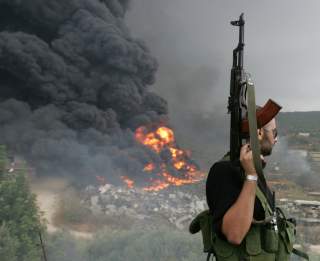The Shia Shift: Why Iran and Hezbollah Abandoned Martyrdom
The shift in the source of suicide terrorism has gone almost entirely unnoticed in the West.
However, Hezbollah only approved such operations when they met two criteria: a high probability of success and a large number of enemy casualties. Thus, Fadlallah stated, “suicide operations should only be carried out if they can bring a political or military change in proportion to the passions that incite a person to make of his body an explosive bomb.” For Fadlallah, some of the earlier suicide bombings, such as the ones against Israeli intelligence centers in Tyre or Metulla, met these criteria. Over time, however, the Israeli military improved its defenses against such attacks, thus decreasing their lethality. At the same time, Hezbollah increased its conventional capability—especially in the form of Katyusha missiles—and no longer needed to resort to such desperate tactics. Consequently, Hezbollah’s leadership gradually turned to other methods.
This growing strength is almost certainly the reason other Shi’a populations across the Middle East have not embraced martyrdom operations, even as they have become the targets of Sunni suicide bombings. In Iraq, Shi’ites make up nearly two-thirds of the population and, following the overthrow of Saddam Hussein, controlled the state apparatus. They therefore confronted the Sunnis from a position of strength, and it was the latter group that turned to suicide attacks.
In Syria, the Alawite population makes up only 13 percent of the population, compared to the nearly 75 percent of the population that is Sunni. Nonetheless, the Alawites have long controlled the state, boast a formidable military, and have received extensive outside support from Hezbollah, Iran and Russia. They have therefore had success against the Sunni-led uprising without resorting to suicide attacks.
While many point to Iran’s human-wave attacks and Hezbollah’s suicide bombings to argue that they are irrational, religious fanatics, a closer look suggests the opposite is true. They appear to have adopted these tactics for brutally pragmatic reasons—namely desperation—and abandoned them once other options were available.
Zachary Keck (@ZacharyKeck) is a former managing editor of the National Interest.
Matthew Sparks is a member of the Board of Directors of the International Counter-Terrorism Youth Network, an organization committed to the promotion of counter-terrorism studies across the globe.

